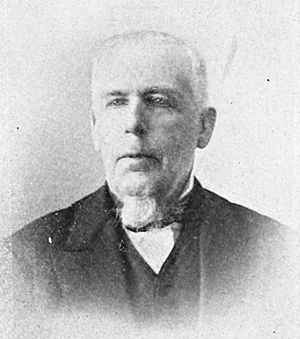Daniel Kirkwood facts for kids
Quick facts for kids
Daniel Kirkwood
|
|
|---|---|

Daniel Kirkwood
|
|
| Born | September 27, 1814 |
| Died | June 11, 1895 (aged 80) |
| Nationality | American |
| Alma mater | York County Academy, York, PA |
| Known for | Discovery of the Kirkwood Gaps |
| Scientific career | |
| Fields | astronomy, mathematics |
| Institutions | University of Delaware Indiana University Jefferson College Stanford University |
Daniel Kirkwood (born September 27, 1814 – died June 11, 1895) was an important American astronomer. He made big discoveries about how planets and asteroids move in space.
Kirkwood was born in Harford County, Maryland. He studied mathematics and graduated in 1838. He then spent many years teaching at different schools. In 1851, he became a professor of mathematics at Delaware College. Later, he moved to Indiana University in 1856, where he taught for most of his career until he retired.
Contents
Discoveries in Space
Kirkwood's most famous work was about asteroids. He looked at all the asteroids that had been found and noticed something interesting. When he organized them by how far they were from the Sun, he saw empty spaces. These empty spaces are now called the Kirkwood gaps.
Understanding the Gaps
Kirkwood figured out that these gaps were caused by orbital resonance. This means that the gravity of a large planet, like Jupiter, pulls on the asteroids in a regular way. If an asteroid's orbit is a simple fraction of Jupiter's orbit (like 1/2 or 1/3), Jupiter's gravity can kick it out of that path over time. This creates the empty spaces, or gaps.
Saturn's Rings and Comets
Kirkwood also thought that a similar idea explained the Cassini Division in Saturn's rings. He believed this gap was caused by the gravity of one of Saturn's moons. He was also the first to correctly suggest that meteor showers are made of pieces left behind by comets.
Kirkwood's Law
Kirkwood also found a pattern between how far planets are from the Sun and how fast they spin. This was called Kirkwood's Law. This idea made him famous among astronomers. Some even called him "the American Kepler" because Kepler also found laws about planetary motion.
However, as scientists got better at measuring how fast planets spin, they found that Kirkwood's Law didn't always work. So, this "Law" is no longer used today.
Later Life and Legacy
In 1891, when he was 77 years old, Kirkwood became a lecturer in astronomy at Stanford University. He passed away in Riverside, California, in 1895.
Kirkwood wrote 129 scientific papers and three books. To honor his work, an asteroid was named 1578 Kirkwood. A crater on the Moon was also named Kirkwood after him. In Bloomington, Indiana, where he taught for many years, Kirkwood Observatory and Kirkwood Avenue are also named in his memory.
See also
 In Spanish: Daniel Kirkwood para niños
In Spanish: Daniel Kirkwood para niños
 | Delilah Pierce |
 | Gordon Parks |
 | Augusta Savage |
 | Charles Ethan Porter |

